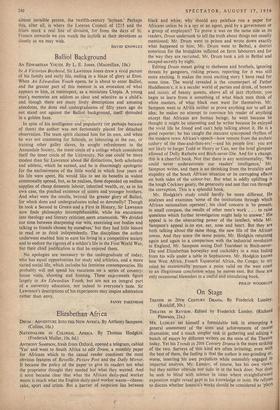Elizabethan Africa
DRUM : ADVENTURE INTO THE NEW AFRICA. By Anthony Sampson. (Collins, 16s.) NATIONALISM IN COLONIAL AFRICA. By Thomas Hodgkin. (Frederick Muller, 10s. 6d.) NATIONALISM IN COLONIAL AFRICA. By Thomas Hodgkin. (Frederick Muller, 10s. 6d.) ANTHONY SAMPSON, fresh from Oxford, opened a telegram, cabled 'Yes' and went to South Africa to edit Drum, a monthly paper for Africans which to the casual reader combines the most obvious features of Reveille, Picture Post and the Daily Mirror. It became the policy of the paper to give its readers not what the proprietor thought they needed but what they wanted. And it soon became clear that what the African daily-paid worker wants is much what the English daily-paid worker wants—cheese- cake, sport and crime. But a barrier of suspicion lies between
black and white; why should any paleface run a paper for Africans unless he is a spy or an agent, paid by a government or a group of employers? To prove it was on the same side as its readers, Drum undertook to tell the truth about things not usually mentioned; Mr. Drum went to prison and wrote down exactly what happened to him; Mr. Drum went to Bethal, a district notorious for the brutalities inflicted on farm labourers and for the way they are recruited; Mr. Drum took a job in Bethal and escaped secretly by night.
Editing Drum meant going to shebeens and brothels, ignoring threats by gangsters, risking prison; reporting for it was still more exciting. It makes the most exciting story I have read for some time. The world revealed is the counterpart of Father Huddleston's; it is a secular world of parties and drink, of boxers and tsotsis, of beauty queens, above all of jazz rhythms; you begin to learn from it something of what black men think of white masters, of what black men want for themselves. Mr. Sampson went to Africa neither to prove anything nor to sell an idea; he makes no attempt to convince his reader of anything except that Africans are human beings; he went because he thought it might be interesting and he writes because he enjoyed the vivid life he found and can't help talking about it. He is a good reporter; he has caught the staccato syncopated rhythm of the modern town African's speech—how remote from the archaic tushery of the thee-and-thou-ers!—and his people live: you are not likely to forget Todd or Henry or Can, nor the brief glimpses allowed of Dolly Rathebe and Bitch-never-Die. And for a change, this is a cheerful book. Not that there is any sentimentality; 'We could never underestimate our readers' intelligence,' Mr. Sampson writes, and there is no shrinking from the brutality and stupidity of the South African situation or its corrupting effects on both sides of the colour-bar. But what is oddly uplifting is the tough Cockney gaiety, the generosity and zest that run through the corruption. This is a splendid book.
Mr. Hodgkin's study could hardly be more different. He analyses and examines 'some of the institutions through which African nationalism operates'; his chief concern is `to present, in small compass, the results of other men's work . . . to raise questions which further investigation might help to answer.' His appeal is to the abstracting power of the intellect, while Mr. Sampson's appeal is .to eye, ear, nose and heart. But they are both talking about the same thing, the new life of the African towns. And they score the same points, Mr. Hodgkin returning again and again to a comparison with the industrial revolution in England, Mr. Sampson seeing Doll Tearsheet in Bitch-never- Die and Elizabethan horseplay and cuckoldry in a man hiding from his wife under a table in Sophiatown. Mr. Hodgkin knows best West Africa, French Equatorial Africa, the Congo; to my mind he occasionally pursues a point valid on the west coast to an illegitimate conclusion when he moves east. But these are only occasional blemishes in a useful and stimulating book.
PHILIP WOODRUFF


































 Previous page
Previous page